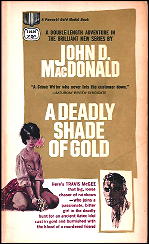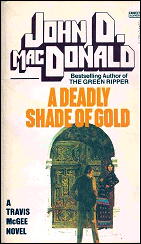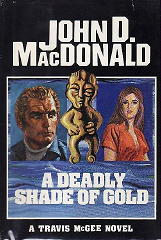Wed 25 Aug 2010
A Review by David L. Vineyard: JOHN D. MacDONALD – A Deadly Shade of Gold.
Posted by Steve under Authors , Characters , Reviews[7] Comments
JOHN D. MacDONALD – A Deadly Shade of Gold. Gold Medal d1499, paperback original, 1965. UK edition: Robert Hale, hardcover, 1967. First US hardcover edition: J. B. Lippincott, 1974. Reprinted many times.

The fifth of the Travis McGee series, and the first labeled a double novel ( or what would become the standard length for entries in the series), A Deadly Shade of Gold is probably the most interesting book in the McGee canon historically for undermining virtually everything critics, fans, and attackers tend to say (and repeat endlessly) about John D. MacDonald and McGee.
In this book McGee not only doesn’t save a woman with redemptive sex, he doesn’t save one at all, suffers guilt over taking advantage of an emotionally vulnerable woman ( “Much of lust is a process of self delusion … back in my own bed I said surly things to jackass McGee about taking rude advantage of the vulnerable, about being a restless greedy animal …”), flat out turns down one such woman’s offer (or Meyer’s on her behalf), is rescued by an attractive woman who initially doesn’t want to have sex with him, watches their relationship deteriorate, and goes home sadder but wiser.
If this is what some critics call the swinging sixties lifestyle as Hefner and Playboy defined it I must have missed a few issues or misread them. In addition he kills a sunbunny ( “… genus playmate californicus …” who is trying to kill him “Hero McGee wins the shootout. He’s death on sunbunnies.”).
This isn’t as unusual as it seems. Critics of Mickey Spillane, Ian Fleming, and even Ernest Hemingway all tended to write a good deal of nonsense about their work based on a superficial and often unsympathetic reading. If it were only critics who made these incomplete statements it would be bad enough, but fans don’t seem to have read the books either in many cases.
McGee here views himself with as jaundiced an eye as any contemporary bachelor in the post feminists world and judges himself more harshly than any critic could ( “We are all guilty. Also, we are all innocent, every one.”). If there is anything here paternalistic, it’s McGee’s constant worry that he will do more harm than good to the women in the case — and all the innocents, and even some of the guilty, who tend to get smashed along the way.
MacDonald doesn’t think women are equal to men — if anything he thinks they are superior ( “I got the hell away from her before I had more awareness than I could comfortably handle.”)
One fan-site that calls MacDonald’s books “classy trash” says more about the fan than MacDonald. Judith Krantz was classy trash. John D. MacDonald was a major American voice working within the boundaries of popular fiction.
Classy trash seldom bears re-reading, MacDonald’s work begs it. Ian Fleming was classy trash, and glad to be that, but MacDonald had higher aspirations and achieved them even within the confines of a series character like McGee. Calling his work classy trash because it appeared in paperback originals is singularly narrow.

Hemingway wrote for Esquire, Fitzgerald the Saturday Evening Post, and Nabokov for Playboy — Mackinlay Kantor, Stephen Becker, Robert Wilder, and Vivian Connell all wrote paperback originals (and all for Gold Medal) — you can’t always judge a writer by his milieu.
A Deadly Shade of Gold opens with the death of McGee’s old friend Sam Taggart, who has just returned to Florida looking to reconnect with Nora Gardino ( “… a lean dark vital woman …”), an attractive local boutique owner he walked away from when he went to Mexico.
With Taggart’s brutal murder McGee finds himself drawn into a case that involves some ancient gold figures Sam has found. The trail leads him to an auction house in New York where he sleeps with a young woman ( “With a brassy forlorn confidence …”) to get information and feels exploited and exploiter for it ( “The physical act, when undertaken for any for any motive but love, and need, is a fragmenting experience.”).
This leads him with Nora to a small (fictional) Mexican fishing village ( “For all the years the generations of them, in the dust and mud and sea smell, had lived and worked and died in this coastal pocket …”) where he is drawn into the illegal trade in antiquities run by a ruthless American, and the schemes of some violent Cuban exile groups.
McGee makes some forays against the American behind the racket ( “… a dull, self-important, rich, silly, sick little man.”), meets a whore who loved Taggart and who is quite human, real and lacking a heart of gold, emotionally smashes an aging playgirl to find out what he needs, feels guilt about exploiting Nora’s grief sexually and gets Nora killed (or blames himself for it), returns to Los Angeles, meets the fabulous Connie ( “I have a very rational approach to my needs and desires.”), who agrees to help him but wants nothing to do with him as a sex partner ( “It would take us too long to find out who was winning, and in the process I might lose.”) because they would fight for control of the situation, avenges Sam, scores a nice profit, damn near gets killed, is rescued by Connie ( “I do not think she expected anything for herself …”), has a brief affair with her that is redemptive for neither of them, and ends up fleeing back to Florida before all that is left are bitter memories ( “There is one thing Senor McGee that is the exact opposite of death.”).
Remind me again about the jovial boat bum who saves all the damsels with his charm and sexual charisma and patented sexual healing while living the Playboy lifestyle:
“Yes, along with the innocent.”
Are we reading the same books?.
And always there are the little moments many of us read MacDonald for, snippets from here and there:

She could have stood there forever, Lot’s wife.
… the challenging promise of great feminine warmth.
A smear of blood has a metallic smell. It smells like freshly sheared copper,
“She is disaster prone, compelled by a bruised heart.”
At sea level the heat was moist, full of the smell of garbage and flowers and a faint salty flavor of the sea.
It is a bedroom gun, with a brash bark like an anxious puppy.
From the shadowy corner came the sound of the bride’s febrile chuckle, and soon he walked out, obsessed with the legality of it all, the permissive access, and all the fishermen at the bar turned slow heads to appraise the departing ripeness of her, and seemed to sigh.
Anxiety makes dreams all to vivid.
She was not pretty. She was merely strong, savage, confident …. and muy guapa .
She was not legend. She did not have a heart of gold, or a heart of ice.
… the deep, ancient, rhythmic affirmations of the flesh.
The ones with no give, the ones with the clear little porcelain hearts shatter.
“His name is Lagarto. Lizard. Hammer-headed thing with a mean eye.”
… the slightest touch would ease her out of that jump suit like a squeezed grape.
These are just a few at random, simply page flipping. This too is another reason to read MacDonald, and why he is not simply classy trash, and why attention should be paid, and the memory of his best work should be accurate and clear, and not the mere repetition of what we have read elsewhere and been told and accepted without testing and knowing for ourselves.
He, and we, deserve better.
John D. MacDonald was the only writer to ever win the National Book Award in the mystery category (for The Green Ripper) it is time we recall who he was, what he did, and admit his achievements go beyond just entertaining us. He wrote a portrait of a place and time and world as real and as accurate as has ever been written, and it is our loss if we forget that or lessen it because he is not as politically correct as some would like.
Much of what he had to say about the American character and American society is as true and accurate today as it was when it was written, and while we should admit his flaws and that he was a man of his world and time, it is past time to discard our own prejudices and honestly evaluate his remarkable contribution.
He was a remarkable writer for his time, or any time. We are only cheating ourselves if we throw him out because we changed while failing to recognize that in many ways the world he showed us has not.
August 25th, 2010 at 6:39 pm
Recently while thinking about JDM and the Travis McGee series, my memories of the series were not on the highest level. After reading the above review, I went into my paperback room and took down the stack of Travis McGee novels, all of which I had read many years ago. Most of them still had my notes concerning quality and grading.
I was surprised to see that I was being too critical and that I had in fact enjoyed all the novels and given most of them my second highest rating of “superb +” Here are my comments after reading A DEADLY SHADE OF GOLD:
“One of his longer efforts. Though it reads like he finished his standard length novel and tacked another 100 pages on, it still is highly enjoyable like all the McGee series. As usual I don’t like the women in JDM’s work, they all are beautiful and there is no such thing as a homely or ugly woman character, or one that doesn’t want to sleep with McGee.”
I love JDM’s other novels, well most of them, and I especially like his pulp work he did in the late 1940’s and early 1950’s for the Popular Publication magazines, such as BLACK MASK, DIME DETECTIVE, DETECTIVE TALES, and NEW DETECTIVE. But I have to admit I have problems with the women in the Travis McGee novels and also I hate it when Travis gets on his soapbox. Otherwise, I’m with David about the quality of JDM’s work.
August 25th, 2010 at 6:42 pm
I’m really enjoying this series of posts. DARKER THAN AMBER was the first McGee I read, and this was the second. Brings back lots of great memories. If I can find the time, I need to reread some of these.
August 25th, 2010 at 7:53 pm
Walker
I agree to the extent there aren’t many average women in a McGee novel (or most of JDM’s books). In fact even Nora’s maid is attractive, strong, and smart in GOLD.
And the first time I read this I had that feeling he tacked on an extra 100 pages too. On rereading, I didn’t feel that, but I certainly see what you are talking about.
It’s funny, because there is a rant in Gold in which JDM and McGee complain about the macho posturing of Hemingway, Ruark and that school (in relation to hunting anyway), and yet I think to some extent the same thing could be said of JDM, but I do think that there is a tendency to underrate JDM and even McGee, and that the fine qualities tend to get lost at times among the minor complaints, the way some critics try to throw away Hemingway forgetting his impact on American literature is second only to Twain.
August 25th, 2010 at 8:22 pm
This is the last of the current series of JDM reviews on this blog, I’m sorry to say, but Walker and James, I’m happy to hear that you’ve enjoyed them, and I hope everyone else has, too.
And maybe they’ll prompt a few people to go back and read the books again (or for the first time). JDM has gone down in the estimation of a lot of people in recent years, and I think they’ve forgotten how good his books were when they were fresh and we were reading them for the first time.
Not that they were uniformly good — no author can manage an “A plus” effort every time out — and opinions can vary, and they do. No book gets an “A plus” from everybody!
Case in point. Marcia Muller didn’t like THE GREEN RIPPER (the previous post) and she did a good job in explaining why. And yet JDM received a National Book Award for it. Figure that one out, if you can.
In any case, the M*F blog will be getting back to its usual routine soon — books and movies, both old and new — perhaps as early as tomorrow, one hopes!
September 4th, 2010 at 9:14 pm
I am one of those lucky people who is still in the midst of reading MacDonald’s work for the first time. He is an amazing writer, and his periodic brilliance makes up for the weak spots – such as a lot of the love scenes, even in a book as good as The Damned. As for the rants, I rather enjoy those, whether I agree with them or not. I do have to space out reading his books, however. His view of human nature is pretty depressing (perhaps because it is mostly accurate.)
September 4th, 2010 at 10:52 pm
Tim
You have to keep in mind at the time that JDM wrote these books the sex scene as such was just loosening up and many writers, MacDonald included, were stretching to see how far they could go within the boundaries of taste and the then tricky legal situation.
JDM wrote about this in regard to the McGee books, pointing out that the blatant eroticism of the books existed in part as a substitute for the possibility of death. Since McGee could not die without ending the series JDM felt the sexual element acted as a substitute for death. Ian Fleming both did something similar with James Bond.
Books today in general are so damn politically correct and sexually vanilla that it’s hard to find anything even remotely ‘bad’ for you.
Frankly I thought JDM wrote sex scenes as well as they have ever been handled in the genre.
But do keep in mind the period, which began with a more open sexuality in Hemingway and then Hammett, and then exploded in the post war era with Mickey Spillane.
This is the period of Harold Robbins, James Gould Cozzens, Rona Jaffe, and Irving Wallace, the Kinsey Report, the Pill, and Simmone De Beauvier not to mention the big obscenity cases that broke the back of censorship to some extent.
Sex was expected and necessary to the paperback original, it was part and parcel of the sale from the Bayre Phillips and Robert McGinnis women on the cover to the ‘adult’ situations present in writers like Prather, Wade Miller, Charles Williams, and the other ‘names.’
JDM did it better and with more skill than the others, but it was as much a part of the what sold his books to adults looking for that element as the mystery of suspense.
But complaining about the sex in the paperback original is a bit like saying you like Raymond Chandler, but just don’t care for first person narration. It ‘was’ the point of the books to some extent. Not mystery, suspense, or action — but a harder edged sexual openess in relation to those other elements.
These books were being sold because of the sexual element as much as any of the soft porn at Greenleaf or the hardcore Olympia Press.
September 5th, 2010 at 1:39 am
Tim
In an way, I envy you and your reading of MacDonald’s books for the first time. I’m sure I read all of the McGee books, though I may have missed one or two, and most of his standalones, back when they first came out.
But I have a confession to make. I’ve read almost nothing by JDM since probably when he died, which was in 1986. (Can it be nearly 25 years ago?)
I did read APRIL EVE a while back, and I reviewed it here:
https://mysteryfile.com/blog/?p=2795
What I’m saying is that when I read MacDonald now, it’s almost as if it were for the first time.
And yet not quite. The slate doesn’t wipe that clean, nor should it!
In any case, though, David’s right. Back in the 1950s and even through the 60s, action-packed paperback originals, especially those from Gold Medal, were also a way of learning what the “real world” was all about.
The “real world” being, in this case, an euphemism for sex and the worldliness that goes with it. Authors like MacDonald, Gil Brewer and Charles Williams and the rest pushed the envelope in all the right directions, no doubt about it, just as David says.way
And today, 25 years and more later, you can’t really go back to those “unenlightened” times again, not all the way, but with authors like MacDonald you can go back and observe — and perhaps understand — if you’re reading him for the first time, or nod your head and remember what it was like, if you read him for the first time way back then
— Steve